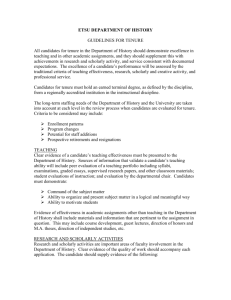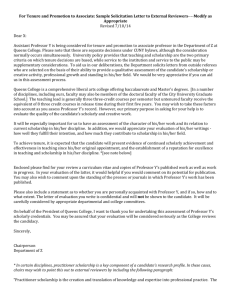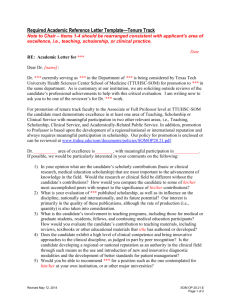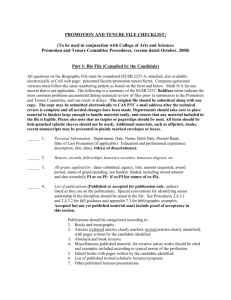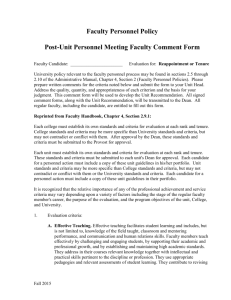College of Letters, Arts and Sciences Department of Political Science
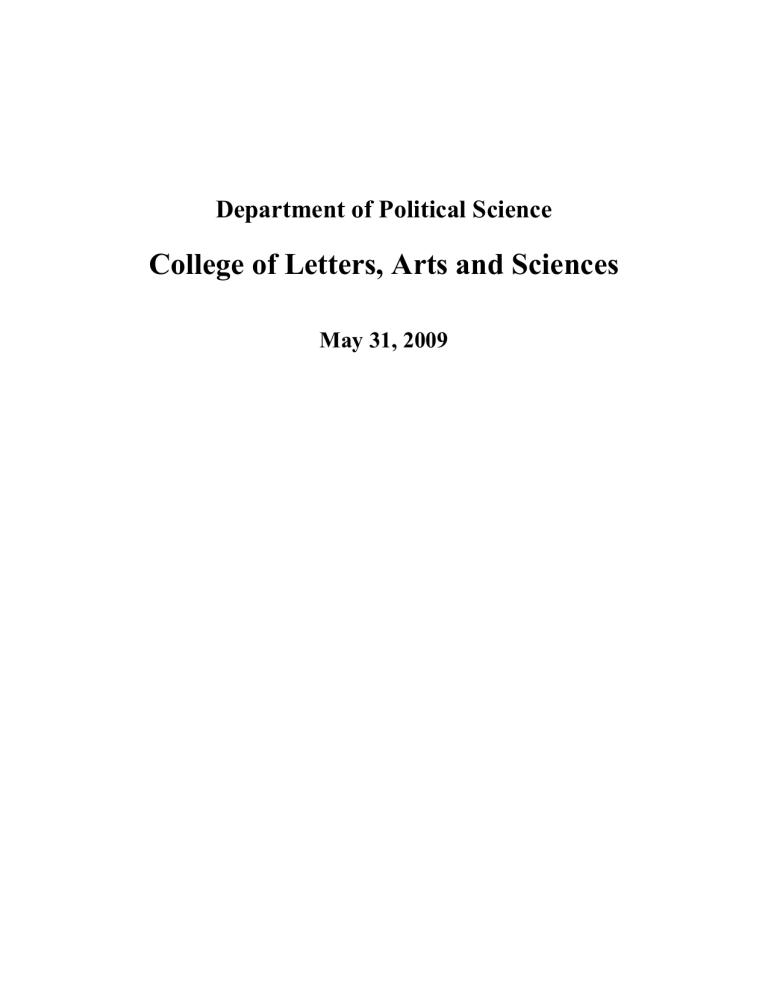
Department of Political Science
College of Letters, Arts and Sciences
May 31, 2009
Political Science Department
Reappointment, Promotion and Tenure Procedures
Approved by the Provost: June 2009
Introduction
Standards and processes for reappointment, promotion and tenure of faculty are governed by
Article V of the Laws of the Regents, Regent’s Policy 5M, and the Administrative Policy
Statements entitled, “Standards, Processes and Procedures for Appointment, Reappointment,
Tenure and Promotion,” “Procedures for Written Standards and Procedures for Pre-Tenure
Faculty,” and “Post-Tenure Review.” Campus guidance is supplied in UCCS Policy #200-
001. These documents require the establishment of departmental criteria to be used throughout the review process.
Department of Political Science Criteria
These criteria are to be considered guidelines for the general review of candidates toward reappointment, promotion and tenure in the Department of Political Science at the University of Colorado at Colorado Springs. The criteria are based on appropriate and current standards of professional performance in our discipline. Each candidate’s case will be reviewed and judged on its individual merits and circumstances. The department is committed to quality teaching, strong research/creative work, and effective service to the university, the profession, and the community. The evaluation process assumes: possession of an appropriate terminal degree; competent education and training in the discipline; conduct which reflects the professional and academic standards for generating, validating, disputing, and transmitting knowledge; and an appreciation of and respect for the rights, duties, and privileges associated with academic freedom and collegial responsibilities.
Tenure Track Promotion and Tenure Criteria:
When these criteria are applied to faculty who were granted time toward tenure during the appointment process, the years granted toward tenure shall be considered equivalent to work performed at UCCS. A faculty member’s career record will be considered in personnel actions described here, but the emphasis of evaluation will be on work performed at UCCS and, in particular, progress since the last review since, in all cases, these reviews are as much about the future as the past.
The following guidelines are designed to assist the faculty in implementing the regental standards for reappointment, promotion and tenure and to clarify the conditions under which candidates merit advancement. The department is strongly committed to innovative and effective teaching, to research and scholarship that makes a contribution to the discipline of political science and that positively affects the world both inside and outside the academy, and to service to both the university and the community. At all levels of review, each candidate will submit a dossier, as outlined in the College's "Guidelines for Faculty
Personnel Actions" (p. 9).
1
All tenured and tenure-track faculty are expected to teach successfully a variety of courses, at both the lower- and upper-division levels (as well as any graduate courses the department may from time to time offer), that allow the department to serve its students well. In addition to classroom teaching, the candidate's work with students outside of the classroom as a mentor, research advisor, independent study director, intern supervisor and similar activities should be considered. Teaching also includes contributions to the breadth, depth, and needs of the department and updating and improving its curriculum, including by the assessment of student learning. The department seeks to encourage its faculty to make contributions to efforts to further student engagement, retention and success on the campus generally. Efforts to improve teaching and learning, especially those efforts shared with colleagues inside and outside the department, are also valued. Efforts to nurture the success of diverse students, and to improve all students’ understanding of diversity, are likewise valued. In interpreting student evaluations, course content, level and size will be carefully considered.
The department recognizes that scholarship can take many forms. Our department emphasizes fundamental discovery, scholarly work that integrates existing knowledge, and applied research. The department values scholarly research that has an impact on public policy or programs, as well research that has an impact on the discipline. We recognize scholarly study of teaching and learning issues in our field as a form of research that has an impact on our discipline. We further recognize that diversity is an important element that may manifest itself in many aspects of scholarship. The department also operates under the understanding that not all scholarly endeavors are successful, and that “playing it safe” inhibits discovery and innovation. Accordingly, we seek to avoid discouraging appropriate and prudent risk-taking by placing a positive value on such scholarship. The general preference as to mode of scholarship will be for refereed journal articles, well placed book chapters, monographs and books published by well respected academic or commercial presses, reports to public agencies that are acknowledged to have made an important contributions to policy making, and other appropriately reviewed publications. Other types of published work, as well as conference and other types of presentations, will also be considered. The department does not consider external funding to be a required part of scholarship in the discipline, but submitted proposals, and especially externally-funded grants awarded, may be an important indicator of meaningful scholarly activity equivalent to refereed publication. Collaborative work, as manifested by co-authorship, is an important aspect of scholarship in the discipline, and especially for inter-disciplinary work, but care must be taken to properly evaluate the contributions of the individual faculty member under review.
The department recognizes service to the department, the campus, the community and to our profession. Beyond the universally-expected robust engagement in the life of the department, the department recognizes many forms of service that should be supported and rewarded. Service on formal committees, administrative service and participation in faculty governance are important forms of service internal to the campus. Likewise, there are many forms of service to the profession and the community. The department recognizes that some forms of service result in additional compensation for the faculty member, but others do not.
We think it is important to recognize both forms of service within the bounds of university policy. The department especially encourages service that results in contributions to diversity, community engagement, and student engagement, retention and success.
2
The Rules of the Regents require that eventually a candidate for tenure and promotion must be evaluated and receive a rating of at least meritorious in all three areas of work (teaching, scholarly, creative and/research, and university service) and an excellent rating in either teaching or research. The Department of Political Science’s standards for a meritorious and/or excellent rating of faculty at the point of tenure are listed below. In general, work in progress is an important consideration in evaluating a candidate during early reappointment processes. It is important to note that the definitions for meritorious and excellent must be based upon progressive accomplishment and in the case of scholarship, work in print (or work that is verified to be forthcoming in print) will be the standard.
First Renewal (Initial Review)
The candidate's total record, including teaching, research and service, shall be evaluated and the record must show sufficient potential of future success to justify reappointment. At this level of review, teaching will normally be the most important element in evaluating faculty performance. In most cases, progress on research and scholarly work will carry more weight than service which, while important, may be more appropriate for those further along in their careers.
1) Teaching
Candidates should have, in their first year, demonstrated a willingness to do their best to advance the goals of the department by teaching the courses they were hired to teach and, as appropriate, to develop new courses they have not previously taught to support the department’s curriculum. The candidate's teaching shall be evaluated by multiple means, including performance on faculty course evaluations (including both the numerical scores and the written comments of students), coherence, organization and appropriate content of courses (as evidenced by syllabi, lecture notes, and other materials), professional development as a teacher (as shown by revisions made in courses or plans for revisions, workshops attended, etc.), accessibility to students, and willingness to contribute to the department's curriculum. At this level, negative-toweak FCQs (instructor and course ratings not substantially above a 4) and poorly conceived or executed course materials are the most likely indicators of significant problems. Each candidate shall submit a teaching portfolio as part of the dossier that provides evidence relating to these factors and that includes a statement of teaching approach and teaching plan outlining the candidate's teaching goals over the next 3-5 years.
2) Scholarly, Creative, and/or Research Work
The candidate is expected to demonstrate a well designed research plan, the potential for continued development as a researcher and progress toward publication. Evidence of progress could, for example, include conference papers presented or accepted for presentation, drafts of articles or book chapters under submission or preparation, research reports submitted to or published by public agencies, research proposals or written descriptions of research in progress, reviews of others work written, serving as a discussant or panel chair at conferences, reviews received from journals or
3
publishers, letters from colleagues evaluating specific work, and other evidence of research activity. For this review, actual publication (in press or in print), especially of work accomplished while at UCCS and particularly refereed journal articles, wellplaced book chapters, or other appropriately-reviewed research shall normally be taken as prima facie evidence of satisfactory progress in this area. As a part of the dossier, each candidate shall submit a research portfolio consisting of examples of the above, a statement of research philosophy and a research plan outlining the candidate's research goals over the next 3-5 years.
3) Service
At this stage, the candidate is expected to participate in the life of the department, and is expected to exhibit civility and professionalism when interacting with his or her colleagues. Faculty are expected to regularly attend department meetings, share in the department's decision making process, and to participate in activities that contribute to the department's well being. At this point, service activity beyond the department is not considered essential.
Second (Comprehensive) Renewal (Reappointment)
The candidate must demonstrate sufficient progress toward tenure to justify reappointment.
The review may also take into account issues of material bearing such as strategic goals of the department, college and campus. At this level, teaching and research should carry roughly equal weight. Although individual candidates may be stronger in one area than the other, the expectation is that performance and potential in each area should be relatively strong. Some development in the area of service beyond the department is also expected.
1) Teaching
The candidate will be expected to demonstrate effective teaching evaluated by multiple means. In addition to the indicators of classroom teaching effectiveness referenced earlier, the candidate's work with students outside of the classroom as a mentor, research advisor, independent study director, intern supervisor and similar activities shall be considered here. In addition to the type of materials appropriate for the first review, the teaching portfolio should include evidence of improvement
(especially if weakness was noted in the first review) and innovation (e.g., the development of new courses, incorporating new techniques, or improving assessment of student learning). In most cases, the portfolio should include peer reviews of the candidate's in-the-classroom performance. This review will be especially sensitive to the contribution the candidate makes to the department's curriculum and student rapport.
2) Research, Creative Work
In addition to the type of materials appropriate for the first review, the research portfolio should include examples of published work. However, in cases where the
4
candidate considers a book to be the most appropriate form of scholarship for his or her research agenda, there may only be evidence that a well developed manuscript is moving towards publication. Grant proposals, and especially grants awarded, may be another way of assessing progress on a research agenda. In all cases, there should be clear indications that future publications will be forthcoming. At this level of review, however, it must still be remembered that it may take considerable time to get work into print. At this stage, therefore, potential for publication may still carry more weight than actual publications. Nevertheless, reappointment should not occur if the committee sees little or no realistic prospect that publications will be forthcoming within the next two years. There will be outside reviews of each candidate's published and submitted work which should emphasize the potential the candidate shows for making a contribution to the discipline.
3) Service
In addition to continuing departmental service, the candidate's record should show development in making extra-departmental contributions. These might include service on university and college committees, election to office in the Faculty Representative
Assembly, participating in university activities, speaking to media or community groups, or volunteer work in the community. Service to the discipline would be especially noteworthy at this stage. In some cases, consulting work, whether compensated or not, may have a service component, if these activities enhance the reputation of the university or enrich the community.
Promotion to Associate Professor and Awarding of Tenure
The candidate's record in teaching, research, and service will be evaluated separately as
“below expectations,” “meritorious,” or “excellent.” The candidate must be rated as at least
“meritorious” in all three areas and must receive a rating of “excellent” in either teaching or research. Service is also required to be relatively strong, but only in very rare cases should it be the strongest of the three areas.
1) Teaching
To be considered meritorious, the candidate will be expected to demonstrate broadly effective teaching. The candidate must have by now demonstrated instructional competence at a high level. It is generally expected that the average instructor and course ratings on recent FCQs be at least at the midpoint of the positive ratings (i.e., a
5), keeping in mind the need to be sensitive to the impact of content, level and class size. The primary unit's assessment should also be sensitive to written student and any peer evaluations in the teaching portfolio. Course materials and teaching philosophy should demonstrate a certain maturity and there should be clear evidence of beyondthe-classroom contributions to the success of students. There should also be clear evidence of contributions to the department or campus’ curriculum in the form of course revisions, participation in curriculum revision, or introduction of courses new to the curriculum.
5
Excellence may be demonstrated in a variety of ways. Receiving a college or campus teaching award or unusually strong student evaluations are two of the more conventional forms such evidence may take in terms of the individual faculty member’s classes. However, demonstrated strong achievement at the department or campus level in curriculum development, furthering student engagement, retention and success, improving teaching, learning and assessment of student learning, or positively impacting diversity for students would also be applicable evidence of excellence. In general, a rating of “excellent” is justified by significantly going beyond the expectations for meritorious in one or more of the areas of emphasis in teaching for the department.
2) Scholarly, Creative and/or Research Work
To be considered meritorious, the research portfolio is expected to demonstrate clear success in publication. While potential for future success is still a consideration, it no longer is a substitute for actual performance. Thus, the greatest weight will be placed on work in print or in press. The general expectation about quantity is that the total be roughly the equivalent of one refereed article per year of service (usually five or six).
If the candidate has chosen book publishing as a major effort of their work, a book published in a fine academic or commercial press and one or two articles is probably to be expected. Competitively-awarded external funding, in combination with some form of refereed publication and appropriately evaluated for scope, also counts as equivalent to publication. It is necessary that the department exercise considerable discretion in judging the quality of the work and in determining whether a particular body of work meets this quantitative standard. In all cases, the quality of the work, and its placement in selective outlets, will be at least as important as the quantity, so that some candidates may be acceptable despite having "low" numbers, while other candidates fail despite meeting strictly numerical criteria. At least some of the external reviews must support the notion that the candidate has made a contribution to the discipline, although the nature of that contribution may be very different for different candidates. Presentations at professional meetings and non-refereed publications, as well as unfunded grant proposals, may be considered as secondary evidence of ongoing research activity.
Excellence in research may be established through exceptional quantity (e.g., the equivalent of 7 or more refereed journal articles of sufficient quality) or exceptional quality or, especially, both. For excellence, quality may depend on the impact of the research on the discipline or in other ways (probably as evidenced by the external reviews or citations), the placement (articles in first or second tier journals, books with particularly prestigious presses, etc.), or the degree to which the work is creative, original or otherwise makes a unique contribution (i.e., is “groundbreaking’ whether or not this characteristic has yet been recognized by the discipline). In general, a rating of “excellence” is justified by a combination of quantity and quality that significantly exceeds the standard for meritorious.
6
3) Service
At this point, the candidate should have a clear record of service both inside and outside the department, as indicated by the activities described at the previous level of review and those in the appendix to this document. A rating of “meritorious” requires meeting service responsibilities within the department and demonstrable service to the college, campus, community or profession. A rating of “excellent” requires meeting service responsibilities within the department and multiple service contributions to the college, campus, community, or profession. In evaluating service, both the quality and quantity of service contributions should be considered.
Promotion to Full Professor
Promotion to full professor requires "a record that, taken as a whole, is judged to be excellent; a record of significant contribution to both graduate and undergraduate education, unless individual or departmental circumstances require a stronger emphasis or singular focus on one or the other; and a record, since receiving tenure and promotion to associate professor, that indicates substantial, significant, and continued growth, development, and accomplishment in teaching and working with students, research, scholarship or creative work, and service." At consideration for promotion to full professor, different faculty will have found very different niches. Although all candidates are expected to make strong contributions in teaching and research, any of the three areas may be more important in a particular candidate's career at this point than the other two. In general, the biggest contrast to the promotion to Associate Professor is that the service component should be more pronounced. Substantial, significant and continued growth, development and accomplishment in each of the areas is explicated below. The excellence of the overall record may be predicated on a balance of substantial performance across the three areas, significant strength in two of the areas and progress in the third, or outstanding performance in one area and progress in the other two.
1) Teaching
The candidate will be expected to demonstrate continued effective teaching, evaluated in much the same way it was at the time of tenure. Substantial, significant and continued growth, development, and accomplishment as a teacher since tenure may be demonstrated through either continued documented improvement and maturation in classroom teaching or the development of new and revised curriculum, adoption of new pedagogical techniques, participation in professional development, work with students outside the classroom and other areas of teaching and the assessment of student learning such as those mentioned in the criteria for tenure and in the appendix.
2) Research
Substantial, significant and continued growth, development, and accomplishment as a researcher since tenure must be demonstrated through refereed publications, peerreviewed grants and other areas of research such as those in the appendix. While this may take many forms, it normally includes a continuing record of publication in
7
outlets similar to those expected at the previous level. The level of productivity, though perhaps even more subject to the department's judgment than previously, should not show a serious decline. Other examples of appropriate activities include textbook authorship (if the text is well received intellectually), editing books
(depending on the quality of the product), and serving as a journal editor. Exploration of new areas of interest, collaboration and innovation may well play a larger role in a scholar’s work at this point in his or her career, as may applied research. Outside reviews at this point should indicate that the candidate's work is viewed as important and authoritative by others in his or her field. Exceptional quality of scholarly work may be considered to raise an evaluation in cases where the quantity is less.
Presentations at professional meetings and non-refereed publications may be considered as secondary evidence of ongoing research activity.
3) Service
Substantial, significant and continued growth, development, and accomplishment in service since tenure may be demonstrated through a discussion of service progress in the department, college, campus, university, community and in our profession. We recognize that different faculty at this level will fulfill this requirement very differently. Some service activities, such as acting in an administrative capacity within the University (e.g., serving as department chair), taking a major role in governance, leadership in professional organizations, or engaging in extensive community activities may be much more appropriate now than at earlier levels. The appendix lists some issues that may be considered.
Post-Tenure Review
The department recognizes that there are many different ways in which post-tenure faculty contribute to the university and that these contributions change over time. The regental requirement of a post-tenure review is an important part not only of faculty accountability, but of affirming those contributions. A faculty member will be evaluated on teaching, scholarship and research, and service based on his or her professional plan, as part of the 5 year cycle of post-tenure review, with any differentiated work load taken into consideration as appropriate. Under a differentiated workload, evaluation of the quantity of work completed in a given area should change based on the differentiated workload, but quality of work should be given same consideration under all work load allocations.
Normally, a faculty member should demonstrate the minimal requirements stated for each evaluation area in order to receive an overall meeting expectations rating, but the committee should consider the total record of the faculty member to determine if an overall acceptable rating is justified. Ratings of exceeding expectations and outstanding will be determined by the post-tenure review evaluation committee based on the materials submitted by the faculty member that demonstrate performance beyond the expected minimum.
8
Teaching
All faculty members are expected to be engaged in teaching activities. To demonstrate meeting expectations in teaching, the following must occur.
Faculty will provide evidence of purposeful attempts to attain the teaching goals stated in the previous professional plan(s).
Faculty will provide evidence of effective teaching.
Faculty will provide evidence that they are involved in working with students outside the classroom.
Faculty will not have a consistent pattern of substantiated negative behavior regarding teaching. Such behavior may include, but is not limited to, consistent disrespectful behavior towards students (e.g., inaccessibility, excessive missing of classes, mistreatment of students, harassment of students) or poor teaching (e.g., lack of substance in teaching, reading textbook/notes to students, excessive rambling, capricious standards for classroom performance, ill-defined curriculum or course planning).
Research/Scholarship
All faculty members are expected to be engaged in scholarly work. To demonstrate meeting expectations in research, the following must occur.
Faculty will provide evidence of purposeful attempts to attain the research goals stated in the previous professional plan(s).
Faculty will provide evidence that he or she has an active and systematic program of research that has regular output of quality research and scholarly work. Examples of such evidence are provided in the appendix.
Faculty will not have substantiated negative behavior regarding research. Such behavior may include, but is not limited to, plagiarism, falsification of data or results,
Service unethical treatment of research participants, or mismanagement of research funds.
All faculty members are expected to be engaged in service activities. To demonstrate meeting expectations in service, the following must occur.
Faculty will provide evidence of purposeful attempts to attain the service goals stated in the previous professional plan(s).
Faculty will provide evidence of service activities to the department.
9
Faculty will demonstrate that he or she is actively involved in service activities beyond the department. Examples of such service are listed in the appendix.
Faculty will not have substantiated negative behavior regarding service. Such
behavior may include, but is not limited to, disrespect towards or harassment of
other faculty and staff; flagrant disregard for department, campus, or system
policies; disengagement from service activities (e.g., not attending faculty meetings or other committee meetings), misrepresentation of self in the community, misuse of university resources.
Faculty Responsibility Statement
Generally, faculty will have a work distribution of 40% research, 40% teaching, and 20% service. No written documentation is needed for this work distribution. If the department and faculty member, with the approval of the dean, agree to a faculty responsibility statement, it will explicate the workload distribution and provide guidance on changes in how the tenure criteria will be weighted for such a differentiated load. Differentiated workloads may impact quantity of work in a given area but are not expected to change quality criteria.
In unusual circumstances, a pre-tenured faculty member may have a differentiated workload that will be delineated in a faculty responsibility statement. It is expected that pre-tenured faculty will only have a differentiated workload for a small proportion of the pre-tenure period (e.g., during a period where a major research grant award is received). A reduction in assigned course load to allow time for additional investment in course preparation would not necessitate a faculty responsibility statement.
Post-tenure faculty may have a differentiated work load to reflect a variety of distributions of efforts or to account for administrative duties. Such differentiated workloads, to the extent that the faculty member and the department wish them to be recognized in the promotion and post-tenure processes, also need to be accounted for in a faculty responsibility statement, which may be in place for a few months or for the remainder of a career. It is expected that all faculty will have research, teaching and service as part of their workload distribution, but the percentages in each area can change to meet the needs of the faculty member and the department. It is generally expected that no one would go below a minimum of 10% in any given category. Please see the appendix for a general explanation of the possible Faculty
Responsibility Statement (FRS).
10
Appendix
Examples of Appropriate Criteria for Faculty Evaluation
A. Teaching
1. Student evaluation of teaching
2. Teaching awards and other outstanding accomplishments in instruction
3. Peer evaluation of teaching
4. Alumni evaluation
5. Quality of doctoral dissertation and master's thesis supervision and graduate
committee contributions
6. Student advising
7. Innovations in teaching
8. Creativity in teaching
9. Participation in teaching-related subject activities
10. Effectiveness of students in succeeding courses and/or in the pursuit of
graduate education and/or in careers
11. Student supervision in professional experience activities, internships, and/or
independent studies
12. Evaluation of student performance in departmental examinations and
assessments
13. Preparation of course material
14. Student development/encouragement (centers of excellence, library
knowledge, learning disability, recognition, encouragement of students, etc.)
15. Course organization
16. New course development
17. Teaching improvement activity (workshops, conferences)
18. Role modeling and mentoring based on a teaching experience on any
educational level.
19. Teaching contribution at any institution in addition to the University of
Colorado
20. Risk factor involved in the teaching venture
21. Contributions of teaching to diversity
22. Contributions to the assessment of student learning
B. Research/Scholarship
1. Peer judged publications
2. Papers prepared for professional conferences
3. Recognition by other scholars of research and publications
4. Creative work
5. Performances
6. Readings
7. Unsponsored research
8. Grants and contracts (sponsored research)
9. Professional reputation (both inside and outside university)
11
10. Evidence of capacity for future achievements
11. Participation in development workshops
12. Participation career development activity (workshops, conferences, summer
schools, etc.)
13. Papers presented at professional workshops, conferences
14. Long-term research projects
15. Expert and technical consultation of research projects
16. Role modeling and mentoring of research on any educational level
17. Risk factor involved in the research venture
18. Cultural and societal impact
19. Contribution to diversity
C. Service
1. Departmental, college, campus and university committees
2. Administrative service (such as assessment coordinator, program director, chair, center director)
3. Service to the profession and discipline (local, state, national, international
level)
4. Consultation and public service
5. Role modeling and mentoring on any educational level
6. Reviewing research proposals
7. Reviewing books in scholarly journals
8. Reviewing grant proposals
9. Refereeing manuscripts
10. Participation at professional conferences, specifically organizational
activities (organizational activities, local planning committees, site visit
details, activities involved in local, regional and national meetings, etc.)
11. Membership in and/or office-holding in professional associations.
12. Service contribution to education at any level and at any institution in
addition to the University of Colorado.
13. Contribution to diversity
14. Participation in faculty governance
This is a list of suggestions and is neither all-inclusive nor a list of requirements.
Items are not ranked or grouped in any order of importance.
12
Further Information Regarding the Faculty Responsibility Statement
The Colorado Springs campus has approved the use of the Faculty Responsibility
Statement (FRS) in faculty evaluation for tenure and promotion. If, for example, the primary unit decides to adopt a standard distribution of responsibilities for all faculty, that must be made clear. Likewise, if the primary unit adopts a standard distribution of responsibilities for pre-tenure faculty, but allows differential FRSs to be employed posttenure, the allowable parameters of difference and the interaction between an individual faculty member’s FRS and the criteria for promotion to full professor must be made as clear as possible. Finally, if a primary unit decides to allow faculty at all levels to operate under differential FRSs, the allowable distributions across the areas of review at each level of seniority and the interaction between the individual faculty member’s FRS and the criteria for promotion and tenure must be made as clear as possible. The FRS must be implemented in such a way that the regental standard of “demonstrated excellence in either teaching, or research [scholarship] or creative work” is met.
For tenured faculty, the professional plan required for post-tenure review and the FRS (if required by the primary unit criteria) should be a single document that meets all the requirements of the primary unit criteria and the post-tenure review process. For all faculty to whom it applies, the FRS should be coordinated with any differentiated workload recognized in the annual merit evaluation process, but the distributions are not required to be identical. An FRS should be put in place for all faculty for whom it is required within 45 days of employment (or following tenure) and should be reviewed and potentially revised each year during the annual merit evaluation process, but may be revised at any time as needed. New (initial or revised) FRS documents must be approved by the department chair and dean, in addition to the agreement of the faculty member.
Each college will develop processes for insuring that all FRS agreements required are in place and meet the requirements enumerated in this policy and the approved primary unit criteria that govern each FRS.
Those departments adopting professional practice as a category for evaluation must be especially clear about what activities fall under not only professional practice, but teaching, research/scholarship/creative work and service as well. Some activities previously considered under one of the existing categories may now be deemed more appropriate for consideration as professional practice. The regents’ policy makes clear that all tenured faculty must have demonstrated significant accomplishments in both teaching and scholarship, and that excellence must be demonstrated in one or the other, but departments have discretion in defining the scope of each and in defining meritorious and excellent performance in each. Departments need to keep in mind that the evaluative weight and the actual workload associated with each category may differ, and that excellence is a function of quality as well as quantity.
13

